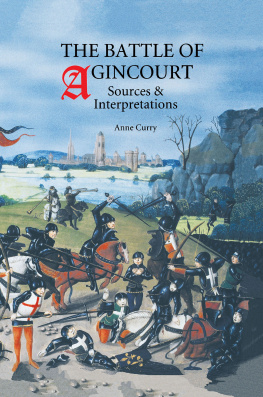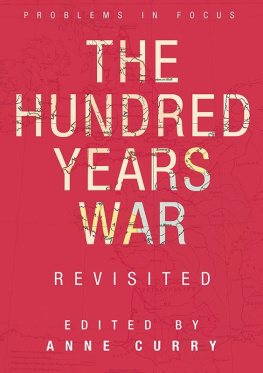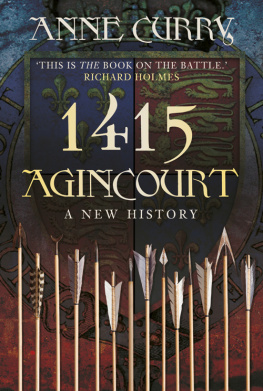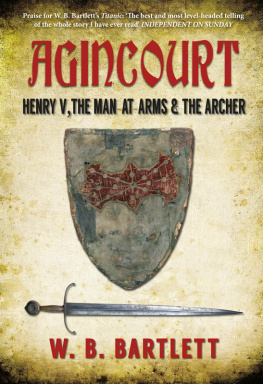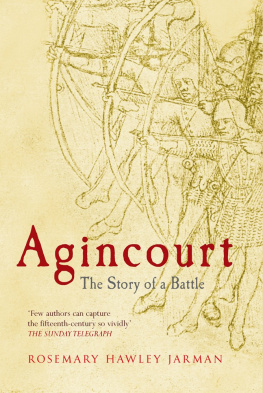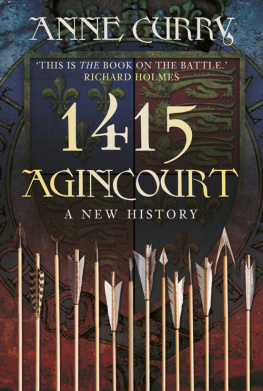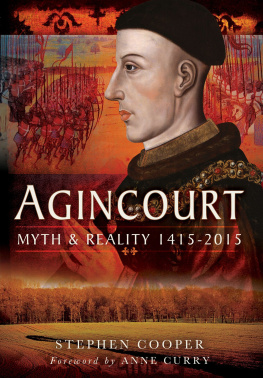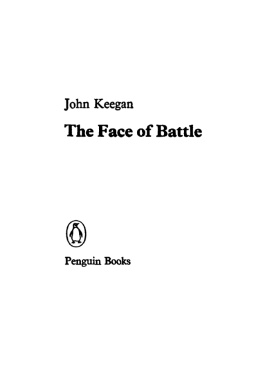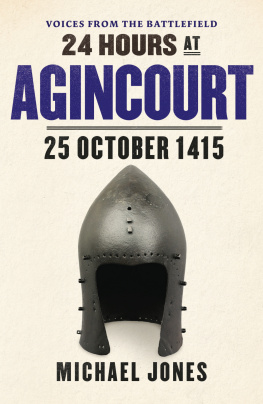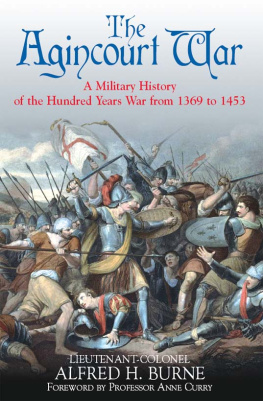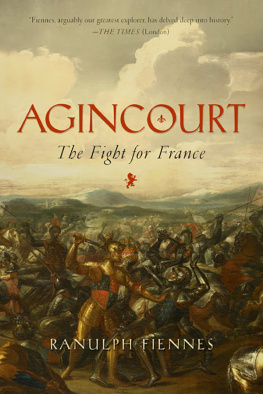Fifteenth-Century Chronicle Sources
Many chronicles of the period include an account of the battle of Agincourt. Only one chronicle, however, the anonymous Gesta Henrici Quinti, can be seen to have been written, at least partly, as a direct result of the battle. In other cases, the account of the battle occurs within a broader chronological narrative covering many years of the century. As is clear from the size of the extracts provided in this chapter, there is much variation in the length and extent of coverage, and in level of detail. Given the constraints of space, only the major accounts are provided here. Although some chronicles, such as the works of Adam of Usk and John Streeche, are generally important for a study of the reign of Henry V, their descriptions of Agincourt are perfunctory and have thus been omitted. In France, it is clear that many accounts of the battle were derived from the chronicle of Enguerran de Monstrelet, with only minor variations, sometimes of a local significance. This has also justified the omission of some accounts; but where relevant, materials which have been excluded are mentioned in the context of other works.
Anyone drawing on chronicle materials needs to be aware of certain key issues; their purpose and nature, authorship, date of composition, sources, reliability, dissemination, connections with, and influences on, other writings. As these are specific to each work, there will be a discussion of such matters preceding each extract so that its particular strengths, emphases and weaknesses can inform the subsequent reading of the text itself. It is sensible, however, to begin with a broader discussion of the chronicle sources as a whole. This is doubly necessary because, as we have already noted, many historians of later centuries, including those of our own, have drawn extensively on the chronicle accounts, accepting them as the definitive versions of the events of 25 October 1415.
We hit a problem right from the start. There are many accounts of the battle. As we shall see, some are intrinsically more reliable than others, but none is exempt from problems of interpretation. There is at base a fundamental difference between English and French accounts. In English chronicles, the emphasis is on triumph against the odds, on the bravery and brilliance of command of Henry himself, and on Gods support for the English cause. As all were written with hindsight, their narratives are crafted to bring out the inevitability, as well as the surprising nature, of the English victory. They are works of triumphalism, and this remains the case even well after the event. French chronicles, on the other hand, are often works of defeat, of reflection and criticism. If the English writers endeavoured to find someone to praise (largely their king and God), then the French writers were looking for someone to blame. It is in their accounts that we have the stress on the foolish pride of the French nobility which led them to attack without caution and, in their desire to keep the glory to themselves, to reject or fail to use other troops which could have assisted them. The French were certain of victory because of their weight of numbers, and because the English army had been weakened by illness and an extended march. But their over-confidence proved their downfall. French chronicles stress the hand of unpredictable fortune, but also often seek to explain why their side lost. There are thus many more excuses for French failure put forward in French compared with English writings. The earliest French account by the Religieux of Saint-Denis is particularly keen to give as many reasons as possible why the French lost. These include the decision to move from an original sound position; the desire of all the nobility to get to the front; political divisions within France; the impetuousness in actual combat, especially of the young, who did not heed the advice of their elders; heavy rain, leading to heavy going, which was a disaster when in heavy armour; the lack of sleep on the night before the battle; disdain for the English, the rejection of the latters overtures for withdrawal on 24 October. The Chronique de Ruisseauville also adds the observation that the French were positioned on newly sown land, the English on uncultivated, firm land. These are all negative factors, and only one positive one the effectiveness of the English archers both with the bow and with the heavy war hammer is given. Some French writings also display a desire to explain why God had forsaken them. This is not absent from English writings but it tends to be used in the latter as an element of triumphalism.
There are some further national differences which are to be expected. The French show a greater interest in the burial of the French dead, the English in Henrys entry to London. There is also generally more interest (and knowledge of?) French actions and movements in French sources, although the fact that the English were marching through their country means they are not devoid of details on Henrys movements. Moreover, Le Fvre was in the company of the English for this period, and Waurin also developed links and interests in English history. They, in company with Monstrelet, composed chivalric chronicles where deeds of arms on both sides of a conflict were worthy of mention. These features, combined with the continuing French desire to explain the English victory by virtue of the deployment of the archers, means that French writers do give attention to English actions. Early English accounts, such as the Gesta, stress French folly and pride, but both there and in later texts, there is a definite feeling that the English won the battle rather than the French losing it, as well as an almost complete ignorance of French deployments.
The most obvious expression of national differences is in the variation seen in the numbers of troops involved on both sides (see ). English accounts tend to exaggerate the size of the French army whilst perhaps minimising their own numbers. Setting aside the late account in the Greyfriars Chronicle, with its rogue, but possibly more accurate, 26,000, all English accounts place the French army at the battle as numbering between 60,000 and 140,000. French writers are on the whole much more reluctant to hazard an opinion on numbers, especially on their own forces, which could of course be taken as testimony in its own right to the fact that they knew the odds had been heavily stacked against the English. Only Monstrelet, Le Fvre and Waurin give a total figure for the French (50,000), although other writers give the sizes of some of the components of the army. As for the English, the Chronique de Ruisseauville mentions 8,0009,000 men although it is not clear whether the archers are in addition; Monstrelet has 14,000 (of which 13,000 are archers), Le Fvre and Waurin 11,000 (including 10,000 archers), and the Berry Herald 17,500, including 15,00016,000 archers. The Religieux has Henry V mention 12,000 archers in his battle speech, but these figures are minuscule compared with those advanced by Juvenal des Ursins at 22,000 and 38,000, with again the vast majority (18,000 and 30,000) as archers, and the 80,000100,000 leaving England according to Perceval de Cagny and Antonio Morosini. Intriguingly, in the Chronique dArthur de Richemont, written with information from Richemont who captured at the battle, the English, at 11,00012,000, outnumber the French, who are given as 10,000! Whilst both French and English give high numbers for French casualties, it is interesting to note that French writers give much higher numbers for English dead than do their English counterparts, who have an obsession with keeping the number around or below 30.
French writers also seek to set the reasons for the defeat within a broader discussion of contemporary political difficulties engendered by the civil war between the Burgundian and Armagnac factions. Almost all of the extant chronicles are pro-Burgundian, some more rabidly than others. Duke John the Fearless (d. 1419) was not present at the battle but his absence is either not mentioned at all in the chronicles, or is explained as the result of the hostility of the other princes of the blood. This is stated even by the anti-Burgundian, Jean Juvenal des Ursins, who is surprisingly oblique in his criticism of the duke.
Next page
